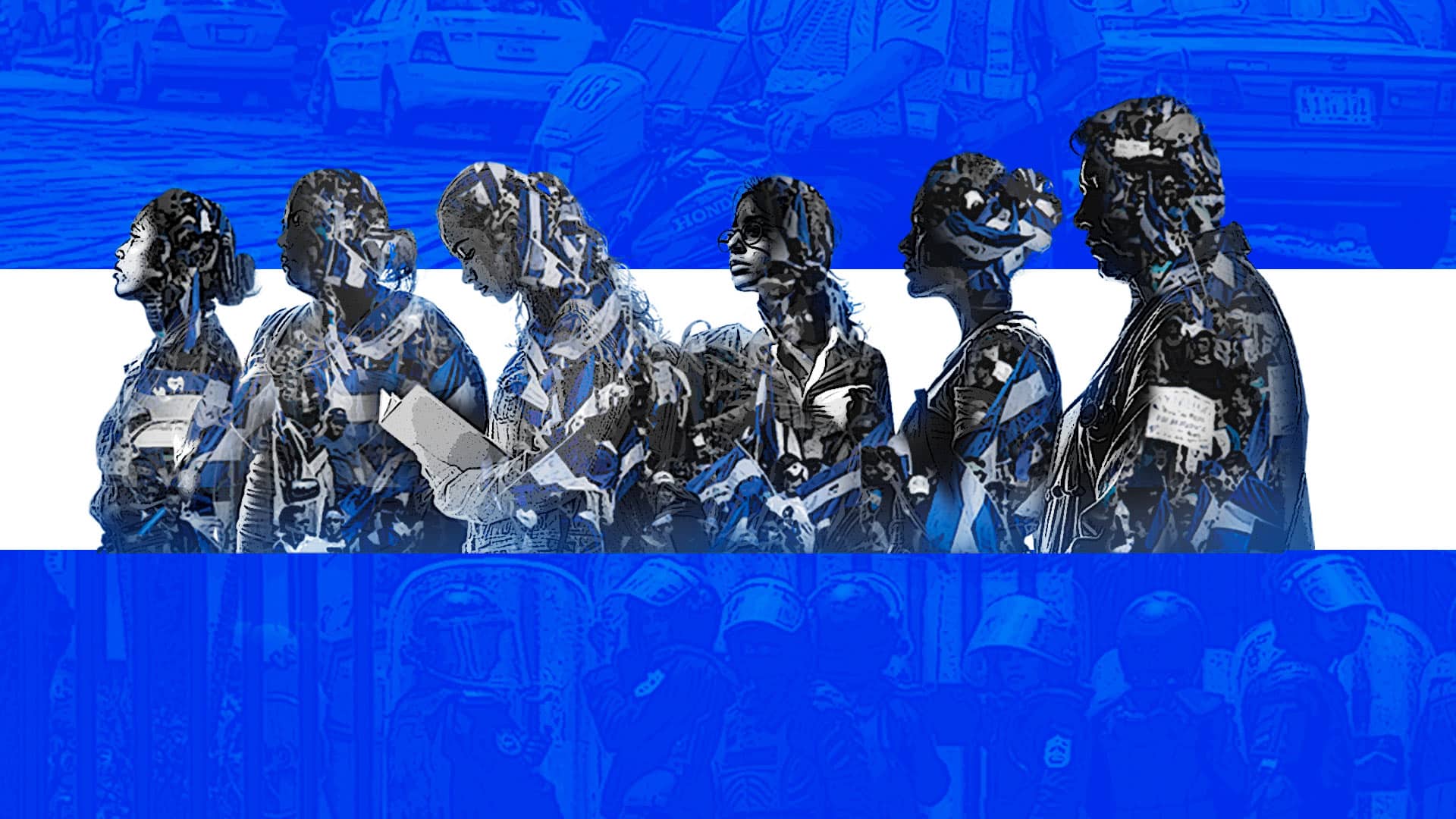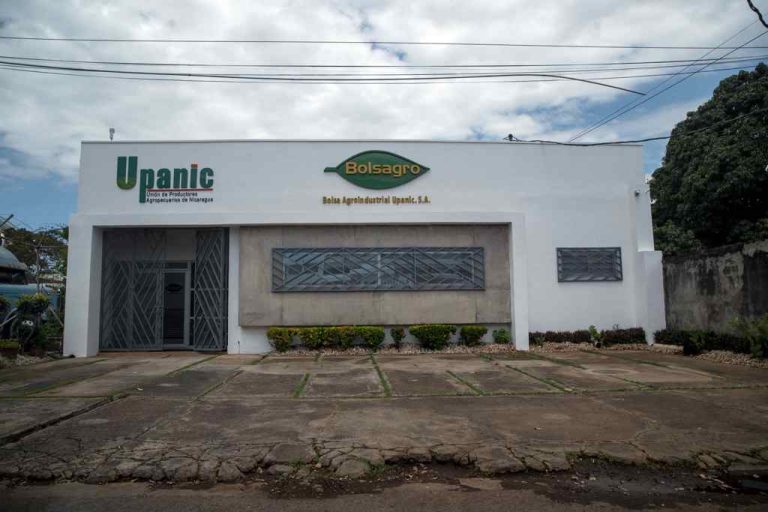8 de marzo 2023

Six Years With April in Tow: Life Under Nicaragua's New 'Normal'

PUBLICIDAD 1M
PUBLICIDAD 4D
PUBLICIDAD 5D
Business organizations will not be able to have employees or bank accounts. “It is a new blow to the economy and the welfare of Nicaraguans”

Fachada del edificio de la Unión de Agropecuarios de Nicaragua (Upanic), en Managua. // Foto: EFE
Despite being a kind of “foretold swipe,” businesspeople and managers organized in the 19 associations that were closed this Monday, March 6, did not expect such a blow, which was unexpected for being, basically, unnecessary. “Both the business organizations and the Superior Council of Private Enterprise (COSEP) itself, were operating at their bare minimum,” the former president of one of the organizations, told Confidencial. He asked not to be identified to avoid possible persecution.
However, the former president and the former treasurer of the National Chamber of Tourism of Nicaragua (CANATUR), Lucy Valenti and Alfredo Gutierrez, respectively, contend that “the legal dismantling of our organization will undoubtedly leave dozens of micro, small, medium and large tourism companies, members and non-members, established in our country, helpless. Thus, exacerbating the serious crisis that our nation has been experiencing since 2018, as well as the adversities resulting from the Covid-19 pandemic.”
In a joint statement, the two former spokespersons assured that “the legal grounds taken into account to dismantle our organization is based on a series of legal prerogatives contrary to the Nicaraguan Constitution, as well as against the right to free enterprise and organization. This seriously threatens the stability and survival of private companies in the tourism sector… both those of national and foreign capital.”
The criterion of both businesspersons is that the state “has surpassed all rational limits and is bent on destroying the productive and capital generating base of our beloved Nicaragua.”
Economist Enrique Saenz said such decisions, or the recent confiscating of the properties of 94 citizens declared “traitors to the homeland,” drives away investment. He noted that such actions mean less contracts and, consequently, less income for families, but also, loans with higher interest rates, once the credit rating agencies downgrade the country’s rating, and the banks must acquire more expensive credits.
Former political prisoner Felix Maradiaga said “the closing of COSEP and its business organizations, is one more step towards the accelerated path of “Cubanization,” undertaken by the Ortega regime. Like other illegal and tyrannical measures, this new blow to public liberties is also a blow to the economy and the welfare of all Nicaraguans, without exception.”
In addition to recalling that “the right of association is a human right,” Maradiaga argues that in the case of the business organizations the right to have associations is “fundamental for economic and social development,” and “to agree on actions that generate employment and attract investments.” He believes that “the closure of COSEP is not only a blow to the private sector, but also to working people.”
A businesswoman affiliated to a chamber of the service sector, remarked that “the annulment of legal status…is yet another blow by the dictatorship against any vestige of what remains of independence from the regime. It is part of the dictatorship’s “Talibanization” process. It is another example that the only thing that matters to them is to hold on to power at any cost. It is a scorched earth policy,” she stated.
The closing of these 19 private sector entities joins that of the Nicaraguan Institute of Development (INDE) in June 2022, and that of the Nicaraguan Association of Private Banks (ASOBANP), on February 3, 2022. In July 2022, the regime had already cancelled the Livestock Exhibition of the Central American Isthmus (EXPICA).
However, these cancellations —according to part of the affected sector— will not deter these entities from continuing some of the initiatives they were promoting, although there are many other things they will not be able to continue doing… such as having employees.
“It is too early to tell you how we are going to proceed, because we are barely analyzing the significance of this cancellation. What I do know is that we can no longer have bank accounts, hire personnel, or many other things for which a legal status is required,” said the executive of a company in the financial sector that was affiliated with one of the shuttered organizations.
When speaking of those decisions that can be implemented, a businessman who provides services in the construction sector said that “in practical terms, this changes nothing,” because “the business chambers as well as COSEP were functioning at a minimum.”
As an example, he said that organizations such as that of urban developers (CADUR), “were not doing anything more than fairs and meeting with the banks to talk, but the government no longer attended to them,” explaining that they will be able to continue doing fairs, if they wish, but “they don’t need legal status to do them.”
He added that CADUR just finished announcing a fair, for which it had the support of the banks, and although they received this sudden bad news, this will not prevent them from holding it, if such is their decision. He said that the same is valid for the Nicaraguan Association of Automotive Vehicle Dealers (ANDIVA), who had a fair scheduled and they will be able to carry it out, because since it will be held inside a shopping center, they do not need to ask for a permit.
On the other hand, the director of an agricultural sector organization explained that “the legal status is useful to have a clear relationship with the government, in accordance with the laws of the country, but nothing prevents us from continuing with our activities, always within the framework of the law.”
The reason why the business organizations do not have clear definitions about their future is precisely the surprise factor mentioned by their executives.
“I didn’t expect it,” said a businessman who provides services in the construction sector. “The question is what made them take the legal status away —and to everyone— it they had already decided not to attribute any importance to the organizations, which is, in fact, what they were already doing. It is very simplistic to think that they did it just because it occurred to them. It was so sudden that it was published at daybreak on Monday in the official Gazette. Something must have happened,” he commented without offering an answer.
For the administrator of a group of companies engaged in the production of animal protein, “this follows a pre-designed script to eliminate all forms of organization: NGOs, business chambers, institutions, etc.”, so it was predictable. However, “it was a surprise in the sense that it happened today, although we were committed to comply with the law, but we were clear that they could do this at any time,” he admitted.
“In COSEP, we have all received references from MIGOB (Ministry of Interior) and we were trying to correct them. With this surprise, each organization declared itself in permanent session and withdrew to evaluate its situation. The ministerial decree says that some failed to comply with providing their financial statements, but the deadline to present them is March 7, so the reception period had not concluded,” he specified.
In his opinion, “this is an anomaly that shows there was a preexisting intention, beyond the logic of compliance and adherence to the laws.” On the other hand, he said that “association activities are inevitable. They happen not because a law allows it, nor do they disappear because a legal status is taken away from them. To have a legal status is a strictly legal matter, but it does not prevent us from continuing organized activities, as long as laws are respected.”
This article was originally published in Spanish in Confidencial and translated by Havana Times
PUBLICIDAD 3M
Periodista nicaragüense, exiliado en Costa Rica. Durante más de veinte años se ha desempeñado en CONFIDENCIAL como periodista de Economía. Antes trabajó en el semanario La Crónica, el diario La Prensa y El Nuevo Diario. Además, ha publicado en el Diario de Hoy, de El Salvador. Ha ganado en dos ocasiones el Premio a la Excelencia en Periodismo Pedro Joaquín Chamorro Cardenal, en Nicaragua.
PUBLICIDAD 3D